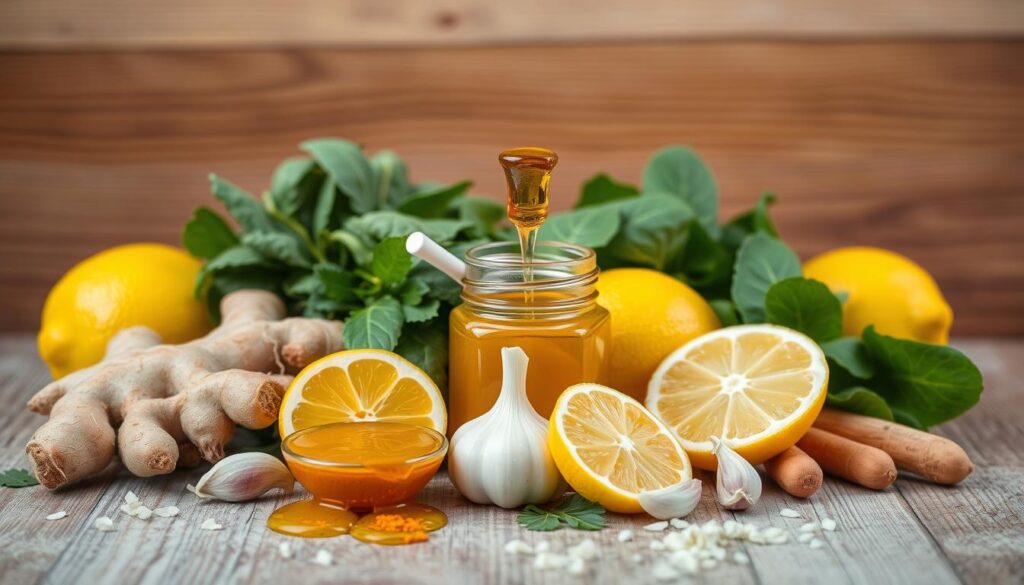The common cold is a widespread illness that bothers millions globally. It can make you feel uncomfortable and mess up your day. But, with the right steps, you can feel better faster. This guide will show you natural ways and tips to beat a cold quickly and get back to normal.
Key Takeaways
- Discover natural remedies to alleviate cold symptoms and speed up recovery
- Learn how to distinguish cold symptoms from other illnesses and when to seek medical attention
- Explore the power of honey, warm liquids, and essential vitamins for cold relief
- Understand the benefits of steam inhalation, nasal irrigation, and gargling solutions
- Discover immune-boosting foods and prevention strategies for future cold episodes
Page Contents
- Understanding the Common Cold and Its Symptoms
- How to Cure Cold Immediately Using Home Remedies
- The Power of Honey and Warm Liquids
- Essential Vitamins and Supplements for Cold Recovery
- Steam Inhalation and Nasal Irrigation Techniques
- Rest and Sleep: Your Body’s Natural Defense
- Gargling Solutions and Throat Relief Methods
- Boosting Your Immune System Naturally
- Foods to Eat and Avoid During a Cold
- Prevention Tips for Future Cold Episodes
- Conclusion
- FAQs
Understanding the Common Cold and Its Symptoms
The common cold is an easily transmitted illness that affects people of all ages. Knowing the symptoms and how to tell it apart from other illnesses is key to managing it well. Let’s explore the common cold and its characteristics.
Distinguishing Cold Symptoms from Other Illnesses
Colds often cause a runny or stuffy nose, sneezing, a sore throat, and a mild cough. These symptoms are generally milder than the flu, which can include a high fever, body aches, and serious breathing problems. Allergies might make your eyes itch and your cough dry, but they usually don’t cause the same nasal congestion and sore throat as colds.
The Stages of a Cold Infection
- Incubation: This is the first stage, where the virus starts to multiply in your body. It usually lasts 1-3 days.
- Acute Symptoms: You’ll start to notice symptoms like a runny nose, sneezing, and a sore throat. These symptoms normally peak in the first week.
- Recovery: Your immune system fights the virus, and symptoms start to get better. This usually takes 7-10 days.
When to Seek Medical Attention
Most colds get better on their own, but you should see a doctor if symptoms last more than 10 days or get worse. Also, seek medical help if you have a high fever, severe headache, or trouble breathing. These could be signs of something more serious, like a sinus infection or pneumonia.
| Symptom | Cold | Flu | Allergy |
|---|---|---|---|
| Fever | Mild, if any | High (usually 101°F or higher) | No fever |
| Body Aches | Mild | Severe | Mild, if any |
| Cough | Mild to moderate, hacking cough | Severe cough | Persistent, dry cough |
| Runny/Stuffy Nose | Common | Sometimes | Very common |
| Sneezing | Frequent | Infrequent | Very frequent |
| Sore Throat | Common | Sometimes | Uncommon |
| Fatigue | Mild | Severe | Mild |
Understanding the common cold, its symptoms, and how it differs from other illnesses helps you manage your health better. It also ensures you get the right medical care when needed.
How to Cure Cold Immediately Using Home Remedies
If you’re feeling under the weather, don’t grab the medicine cabinet just yet. There are many natural cold cures and effective home remedies that can help. These DIY cold treatments use things you likely have at home, making them easy and affordable.
Ginger and Lemon Tea
Ginger is great for fighting cold symptoms. It can relieve stuffy noses and sore throats. Mix grated ginger, lemon juice, and honey in hot water for a tea that boosts your immune system. Drink it all day to feel better.
Garlic and Honey
Garlic is a natural fighter against cold viruses. Crush some garlic and mix it with honey for a cough and congestion reliever. Take this mixture often to help you get better faster.
| Home Remedy | Benefits | How to Use |
|---|---|---|
| Salt Water Gargle | Reduces throat inflammation and soothes pain | Dissolve 1/2 teaspoon of salt in a glass of warm water and gargle several times a day. |
| Turmeric Milk | Boosts immunity and has anti-inflammatory properties | Mix 1 teaspoon of ground turmeric in a cup of warm milk and drink daily. |
| Peppermint Tea | Soothes a sore throat and clears nasal congestion | Steep fresh peppermint leaves in hot water and enjoy the soothing, menthol-rich beverage. |
Try these natural cold cures and DIY cold treatments every day. They can help you get over a cold faster. The important thing is to start right away and keep it up for the best results.
The Power of Honey and Warm Liquids
Honey and warm liquids are great for fighting colds. Honey’s antibacterial and anti-inflammatory properties are well-known. It helps soothe sore throats and boost the immune system. Warm drinks like herbal teas offer comfort, hydration, and extra health benefits to help you get better.
Benefits of Different Types of Honey
Not all honey is the same. Each type has its own benefits for cold symptoms. Manuka honey has high antimicrobial properties. Buckwheat honey is full of antioxidants and can help with coughs. Honey’s ability to soothe the throat makes it a great remedy for colds.
Herbal Tea Combinations for Cold Relief
Warm herbal teas can help you feel better. Teas with ginger, turmeric, or elderberry are good for fighting inflammation and boosting immunity. Chamomile and peppermint teas can ease congestion and soothe your respiratory system. Try different teas to find what works best for you.
When and How to Consume Warm Beverages
Drinking warm liquids at the right time is important. A warm honey-infused tea or warm lemon water can offer quick relief. Drink these several times a day, especially in the morning and before bed. Take small sips to let the warmth soothe your throat and nose.
Using honey and warm liquids can help you naturally fight cold symptoms. They support your body’s healing process.
Essential Vitamins and Supplements for Cold Recovery
Colds can make us feel really sick. But, there are vitamins and supplements that can help our immune system. These natural fighters can speed up our recovery.
Vitamin C: The Immune Powerhouse
Vitamin C is a well-known immune-boosting vitamin that can help shorten the duration of a cold. We should aim for 500-1,000 mg of vitamin C daily. This can come from citrus fruits, bell peppers, or supplements. Vitamin C helps make white blood cells and protects cells from harm.
Zinc: The Cold-Busting Mineral
Zinc is key in fighting colds. Taking 75-100 mg of zinc daily can lessen symptoms. Foods rich in zinc include oysters, beef, and lentils.
| Vitamin/Supplement | Recommended Dosage | Potential Benefits |
|---|---|---|
| Vitamin C | 500-1,000 mg daily | Supports immune function, acts as an antioxidant |
| Zinc | 75-100 mg daily | Reduces severity and duration of cold symptoms |
| Vitamin D | 2,000-5,000 IU daily | Enhances immune response, may reduce risk of respiratory infections |
| Elderberry | 400-600 mg daily | Possesses anti-viral and anti-inflammatory properties, may shorten cold duration |
A healthcare professional should be consulted before starting a new supplement program. This is particularly true if you take medicine or have health conditions.
Steam Inhalation and Nasal Irrigation Techniques
For cold symptoms, steam treatment and nasal cleansing work wonders. They can ease congestion, reduce swelling, and aid in healing. Let’s look at how to use them best for your cold.
Proper Steam Inhalation Methods
Steam inhalation is a classic way to tackle nasal and sinus blockages. Start by boiling water in a big bowl. Then, lean over it with a towel over your head to catch the steam.
Breathe deeply to let the warm, moist air reach your nose and sinuses. This can make mucus thinner, reduce swelling, and offer comfort. But, be careful not to burn yourself. Limit your sessions to 10-15 minutes to avoid irritation.
Using a Neti Pot Safely
Nasal irrigation with a neti pot is also effective for clearing congestion. You can cleanse your nasal passages with a warm saline solution.This can remove mucus, bacteria, and irritants.
When using a neti pot, always follow the instructions. Use only purified or distilled water to avoid harmful germs. Do this once or twice a day for the best results.
Adding Essential Oils for Enhanced Benefits
Adding essential oils for congestion like peppermint or eucalyptus can enhance your steam or neti pot experience. These oils can open up your airways, make breathing easier, and feel soothing. Just remember to start with small amounts due to individual sensitivities.
By using these steam therapy for colds and nasal irrigation benefits, you can naturally help your cold symptoms. Try multiple approaches to determine what works best for you. See a doctor if your symptoms get worse or don’t get better.
Rest and Sleep: Your Body’s Natural Defense
When fighting a cold, rest and sleep are key. Good sleep helps your immune system fight off the virus. It makes your body strong against the cold symptoms.
Sleep is when your body gets stronger. It lets your immune cells recharge. It also lowers stress and inflammation, which can weaken you. By sleeping well, you help your body heal faster from a cold.
Sleep Hygiene Tips for Cold Recovery
- Aim for 7-9 hours of sleep each night to support your immune system.
- Even on the weekends, stick to a regular sleep pattern to manage your body’s internal clock.
- Create a cool, dark, and quiet sleep environment to promote better quality sleep.
- Avoid screens and stimulating activities close to bedtime to ensure a smooth transition to sleep.
- To lower stress and enhance sleep, try relaxation methods like deep breathing or meditation.
By focusing on rest and good sleep habits, you can fight off a cold faster. Taking care of your sleep is a key part of getting better quickly.
| Sleep and Immunity | Rest for Cold Recovery | Sleep Hygiene Tips |
|---|---|---|
| Sleep plays a crucial role in supporting the immune system, allowing it to function at its best to combat viral infections. | Adequate rest is essential for the body to regenerate, reduce inflammation, and manage stress hormones during a cold. | Establishing a consistent sleep schedule, creating a sleep-conducive environment, and practicing relaxation techniques can improve sleep quality and support cold recovery. |

Gargling Solutions and Throat Relief Methods
It can be difficult to manage a sore throat caused by a cold. Simple gargling solutions and natural soothers can help a lot. SSalt water gargling helps reduce inflammation and reduce pain. Natural lozenges made from honey, licorice, or menthol can also soothe and protect your throat.
Salt Water Gargle Recipes
For a salt water rinse, add 1/2 teaspoon of salt in warm water. Pay attention to the back of your throat as you swish the solution around in your mouth. Then, spit it out. Do this several times a day to help with sore throat symptoms.
Natural Throat Soothers
- Honey: Honey has antibacterial and anti-inflammatory properties. A sore throat can be soothed and treated with it.Enjoy a tablespoon of honey or mix it with warm water or herbal tea.
- Licorice root: This natural herb has been used for centuries to relieve cough and sore throat. You can find licorice-based throat lozenges or suck on a piece of licorice root.
- Menthol: Menthol’s cooling sensation can provide temporary relief for a sore, irritated throat. Look for natural throat sprays or lozenges containing menthol.
Adding these simple gargling solutions and natural soothers to your routine can help you find relief and recover faster.
| Gargling Solution | Benefits | How to Use |
|---|---|---|
| Salt Water | Reduces inflammation, eases pain | Mix 1/2 tsp salt in a glass of warm water, gargle and spit out |
| Honey | Antibacterial, anti-inflammatory, coats throat | Consume a spoonful or mix with warm water/tea |
| Licorice Root | Relieves cough and sore throat | Suck on a piece of licorice root or use lozenges |
| Menthol | Provides cooling, temporary relief | Use natural throat sprays or lozenges containing menthol |
Boosting Your Immune System Naturally
Keeping your immune system strong is key to fighting off colds and other illnesses. Luckily, there are several natural ways to increase your body’s defenses. By adding these natural immune boosters to your lifestyle, you can improve your immunity. This helps protect you from cold symptoms.
Fuel Up with Immune-Boosting Nutrients
Eating a diet rich in nutrients is essential for a strong immune system. Make sure to include these immunity-enhancing foods in your meals:
- Citrus fruits, such oranges and lemons, which are high in vitamin C
- Garlic, known for its antibacterial and antiviral properties
- Ginger, which has potent anti-inflammatory effects
- Spinach and other leafy greens, packed with vitamins and minerals
- Yogurt and other probiotic-rich foods to support digestive health
Get Moving for Better Immunity
Regular exercise is great for your health and can boost your immunity and prevent colds. Try to do at least 30 minutes of moderate activity daily. This could be brisk walking, swimming, or cycling.
Manage Stress to Support Your Immune System
Too much stress can weaken your immune system, making you more likely to get sick. Try to include stress-relieving activities in your daily life. Activities like meditation, yoga, or just relaxing can help.
By making these natural lifestyle choices for immunity, you can strengthen your body’s defenses. This makes you more resilient to common colds and other viral infections.

Foods to Eat and Avoid During a Cold
When you’re fighting a cold, what you eat matters a lot. Some cold-fighting foods can help your body fight off the illness. Others might make things worse. Let’s look at the best and worst foods for when you’re sick.
Immune-Boosting Food Choices
To help your body fight off the cold, eat these diet for cold recovery foods:
- Citrus fruits like oranges, lemons, and limes, which are rich in vitamin C
- Garlic, which contains antimicrobial properties to fight off infections
- Ginger, known for its anti-inflammatory and soothing effects on the throat
- Chicken soup, a time-honored remedy that can help thin mucus and ease congestion
- Probiotics, such as yogurt or kefir, to support gut health and immune function
Foods That May Worsen Symptoms
But, there are foods you should limit or avoid when you’re sick:
- Dairy products, which can increase mucus production and worsen congestion
- Spicy or acidic foods, which may irritate a sore throat
- Alcohol, as it can dehydrate the body and impair immune function
- Fried and processed foods may cause inflammation.
Eating nourishing, cold-fighting foods and avoiding irritants can help your body recover. This way, you can feel better faster.
Prevention Tips for Future Cold Episodes
To avoid catching a cold, it’s key to use cold prevention strategies, keep up with hygiene habits, and care for your immune system maintenance. These steps can help lower the number and impact of colds you get.
Strengthen Your Immune System
A strong immune system fights off the common cold well. Here are some methods to strengthen your body’s defenses:
- Eat a diet full of vitamins C, D, and zinc.
- Stay active to keep your body healthy.
- Use stress-reducing activities like meditation or yoga.
- Make sure you get enough sleep so your body can heal.
Practice Proper Hygiene
Good hygiene habits can also help prevent colds. Here’s how:
- Wash your hands frequently with soap and water, particularly before touching your face or eating.
- Don’t touch your eyes, nose, and mouth, as they let viruses in.
- Clean surfaces like doorknobs, keyboards, and phones often.
- To prevent germs from spreading, cover your mouth and nose when coughing or sneezing.
Be Proactive with Prevention
Along with a strong immune system and good hygiene, there are more cold prevention strategies to try:
- Stay away from people with cold symptoms.
- Take supplements like echinacea or garlic during cold seasons.
- Wear the right clothes for the weather to keep warm and strong.
- Keep stress low, as it can weaken your immune system.
By following these tips, you can lower your chance of getting colds and stay healthy all year.
Conclusion
Natural remedies and lifestyle changes can really help with the common cold. Knowing the symptoms and when to see a doctor is key. This way, you can manage your cold and find relief fast.
Honey, warm liquids, vitamins, and steam can make a big difference. They help ease cold symptoms and speed up recovery. Adding rest, immune-boosting foods, and prevention can also help keep your body strong against colds.
Choosing natural ways to treat colds can help you feel better quickly. It also improves your overall health. Try the tips from this guide and see how natural remedies can make you healthier and happier.
FAQs
How long does a cold typically last?
A cold usually lasts 7 to 10 days. But, it can sometimes last up to two weeks. How long it lasts depends on your health and how strong your immune system is.
When should I see a doctor for a cold?
See a doctor if your cold lasts more than 10 days or if you have a high fever. Also, if you have severe sinus pain or a weakened immune system, it’s important to get checked.
What are some effective home remedies to cure a cold quickly?
To cure a cold quickly, get plenty of rest and stay hydrated. Honey and warm liquids can help. Taking vitamin C and zinc supplements and trying steam inhalation or nasal irrigation are also good options.
What types of honey are best for treating cold symptoms?
Raw, unprocessed honey, manuka honey, and propolis-rich honey are good for cold symptoms. They can help soothe a sore throat and cough.
How do I properly use a Neti pot for nasal irrigation?
Use only sterile, distilled, or boiled and cooled water in a Neti pot. Gently rinse each nostril, tilting your head to let the solution flow out the other nostril.
What types of foods should I eat and avoid when I have a cold?
Eat citrus fruits, berries, leafy greens, garlic, and ginger when you have a cold. Warm soups or broths are also good. Avoid dairy, sugary foods, and alcohol as they can make symptoms worse.

